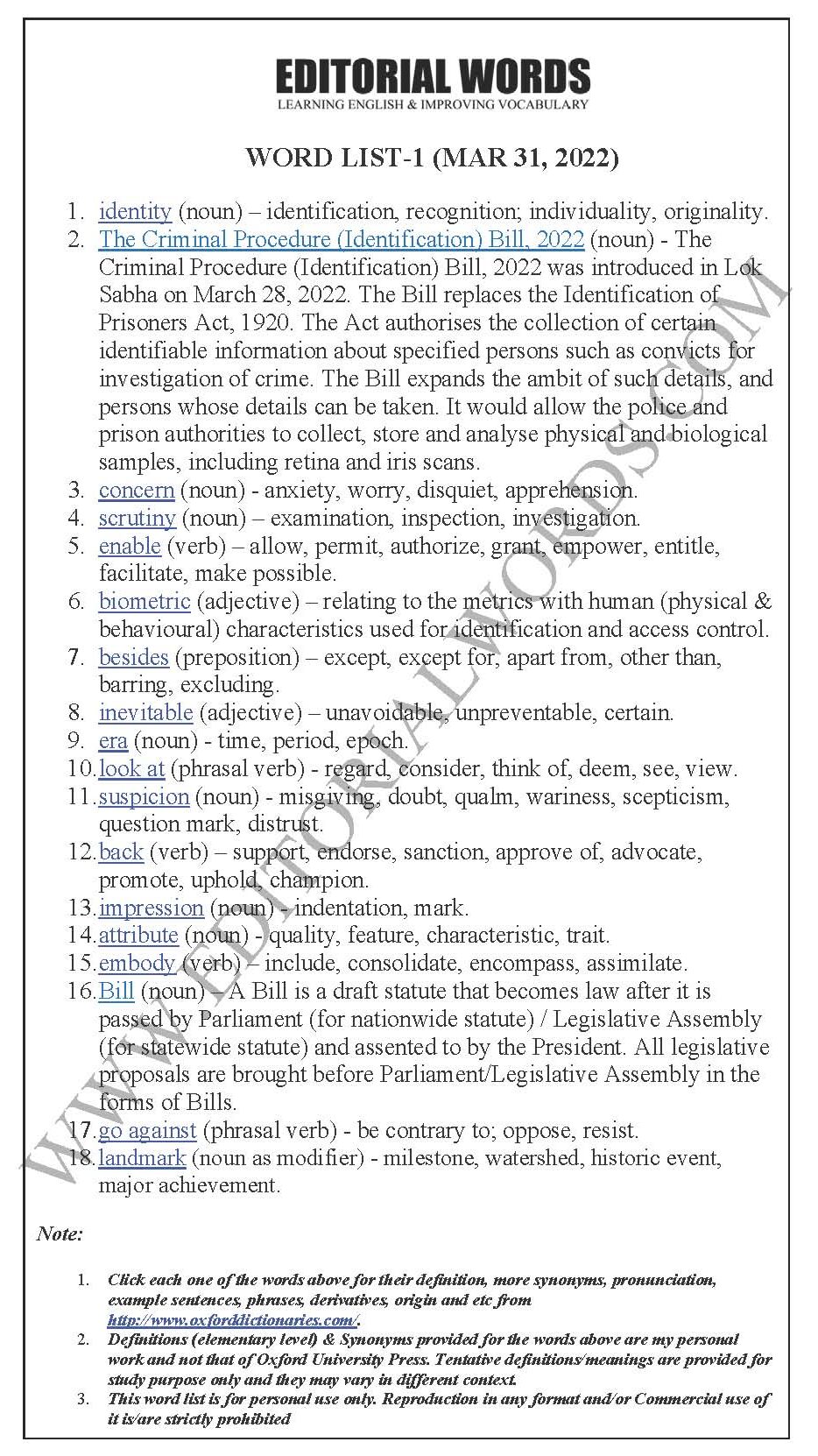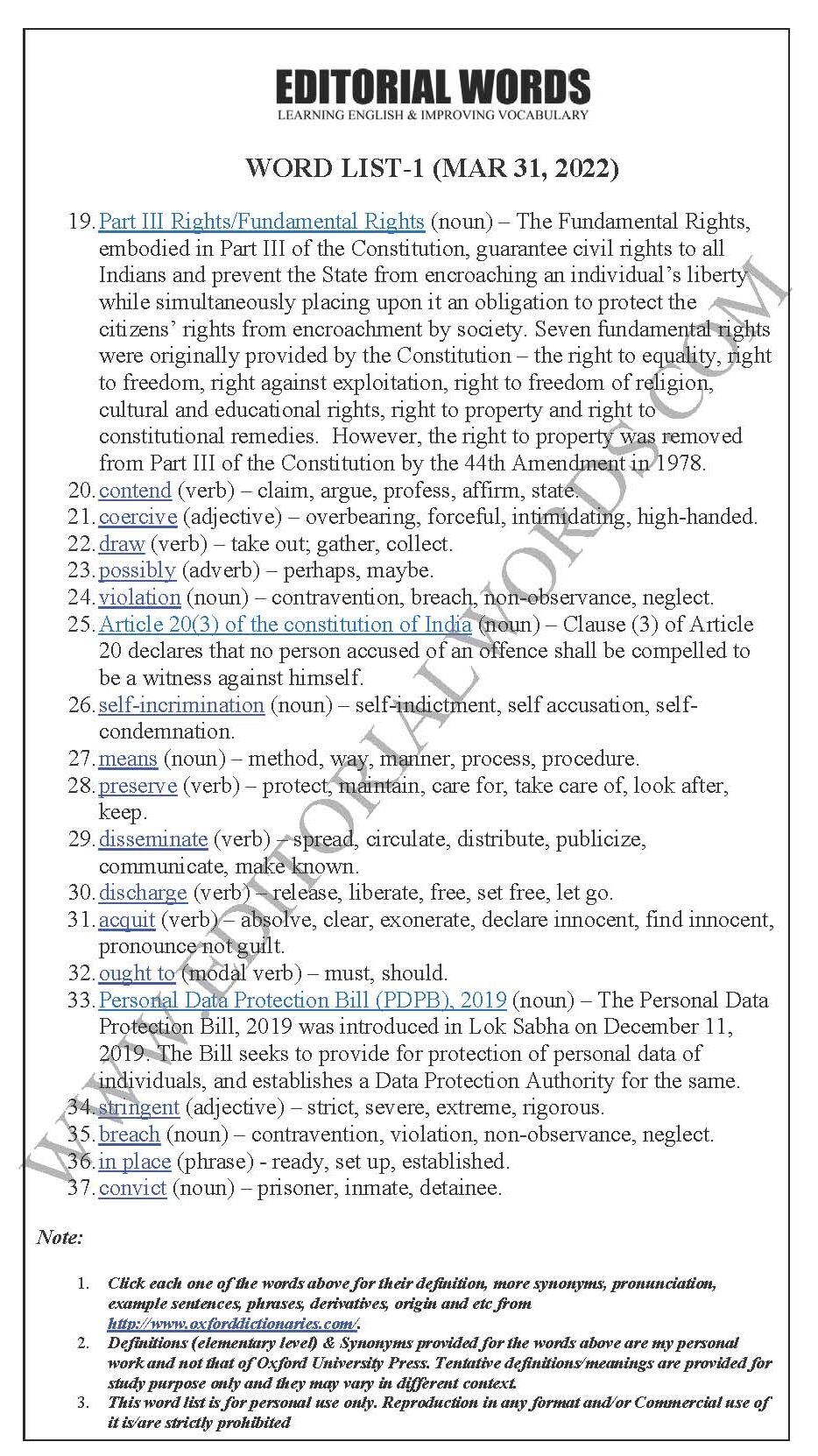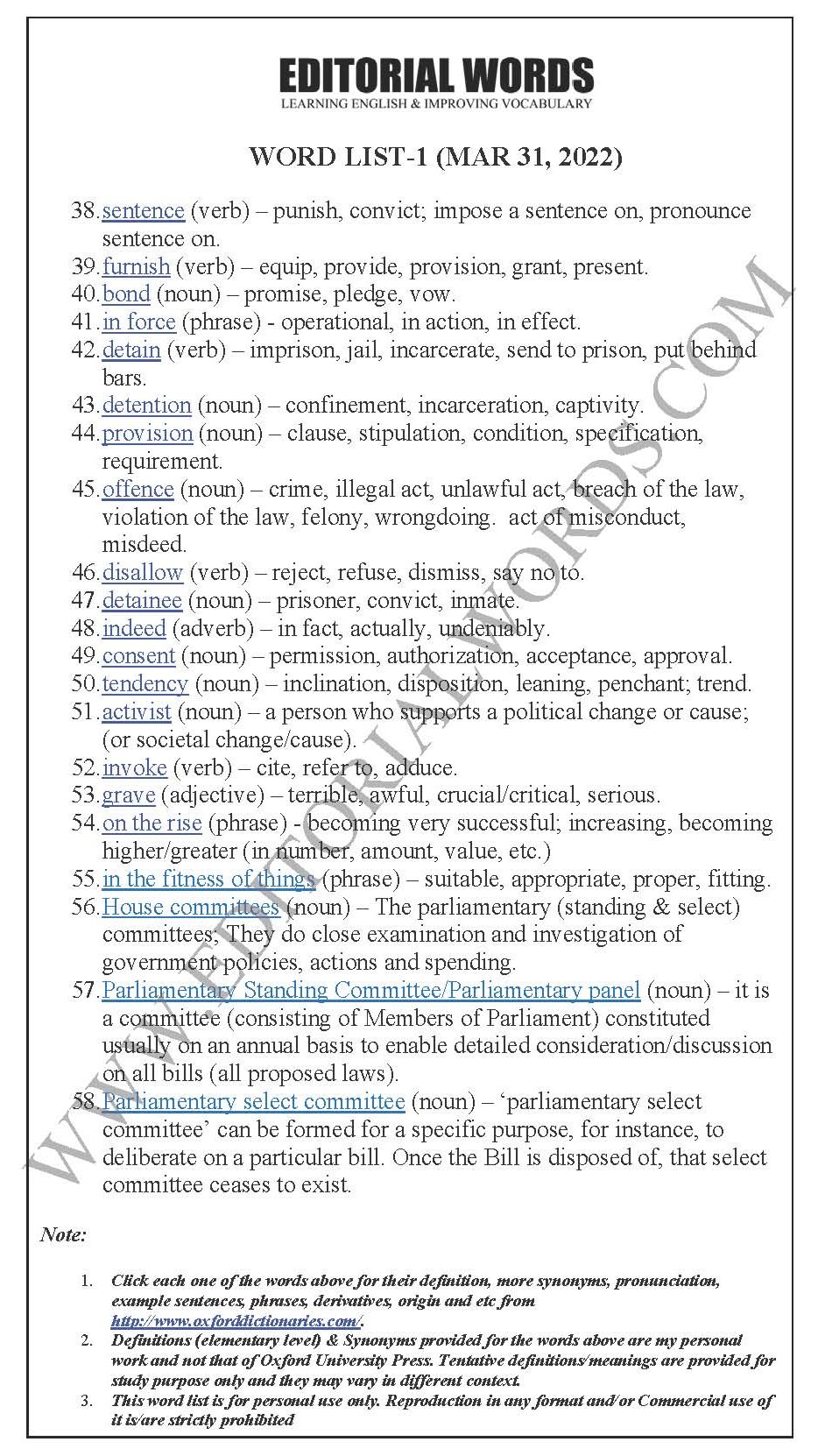The Hindu Editorial (Identity and privacy) – Mar 31, 2022
The Union government’s latest proposal to enable the collection of biometric and biological data from prisoners, besides the usual physical measurements, photographs and finger-prints, raises serious questions about its legal validity… For further reading, visit “The Hindu”. Below is today’s word list-1 for The Hindu Editorial (Identity and privacy) – Mar 31, 2022.
To read this article, click “The Hindu”.
This preview is provided here with permission.
Courtesy: The Hindu
The Hindu Editorial (Identity and privacy) – Mar 31, 2022:
- identity (noun) – identification, recognition; individuality, originality.
- The Criminal Procedure (Identification) Bill, 2022 (noun) – The Criminal Procedure (Identification) Bill, 2022 was introduced in Lok Sabha on March 28, 2022. The Bill replaces the Identification of Prisoners Act, 1920. The Act authorises the collection of certain identifiable information about specified persons such as convicts for investigation of crime. The Bill expands the ambit of such details, and persons whose details can be taken. It would allow the police and prison authorities to collect, store and analyse physical and biological samples, including retina and iris scans.
- concern (noun) – anxiety, worry, disquiet, apprehension.
- scrutiny (noun) – examination, inspection, investigation.
- enable (verb) – allow, permit, authorize, grant, empower, entitle, facilitate, make possible.
- biometric (adjective) – relating to the metrics with human (physical & behavioural) characteristics used for identification and access control.
- besides (preposition) – except, except for, apart from, other than, barring, excluding.
- inevitable (adjective) – unavoidable, unpreventable, certain.
- era (noun) – time, period, epoch.
- look at (phrasal verb) – regard, consider, think of, deem, see, view.
- suspicion (noun) – misgiving, doubt, qualm, wariness, scepticism, question mark, distrust.
- back (verb) – support, endorse, sanction, approve of, advocate, promote, uphold, champion.
- impression (noun) – indentation ,mark.
- attribute (noun) – quality, feature, characteristic, trait.
- embody (verb) – include, consolidate, encompass, assimilate, integrate.
- Bill (noun) – A Bill is a draft statute that becomes law after it is passed by Parliament ( for nationwide statute) / Legislative Assembly (for statewide statute) and assented to by the President. All legislative proposals are brought before Parliament/Legislative Assembly in the forms of Bills.
- go against (phrasal verb) – be contrary to; oppose, resist.
- landmark (noun as modifier) – milestone, watershed, historic event, major achievement.
- Part III Rights/Fundamental Rights (noun) – The Fundamental Rights, embodied in Part III of the Constitution, guarantee civil rights to all Indians and prevent the State from encroaching an individual’s liberty while simultaneously placing upon it an obligation to protect the citizens’ rights from encroachment by society. Seven fundamental rights were originally provided by the Constitution – the right to equality, right to freedom, right against exploitation, right to freedom of religion, cultural and educational rights, right to property and right to constitutional remedies. However, the right to property was removed from Part III of the Constitution by the 44th Amendment in 1978.
- contend (verb) – claim, argue, profess, affirm, state.
- coercive (adjective) – overbearing, forceful, intimidating, high-handed.
- draw (verb) – take out; gather, collect.
- possibly (adverb) – perhaps, maybe.
- violation (noun) – contravention, breach, non-observance, neglect.
- Article 20(3) of the constitution of India (noun) – Clause (3) of Article 20 declares that no person accused of an offence shall be compelled to be a witness against himself.
- self-incrimination (noun) – self-indictment, self accusation, self-condemnation.
- means (noun) – method, way, manner, process, procedure.
- preserve (verb) – protect, maintain, care for, take care of, look after, keep.
- disseminate (verb) – spread, circulate, distribute, publicize, communicate, make known.
- discharge (verb) – release, liberate, free, set free, let go.
- acquit (verb) – absolve, clear, exonerate, declare innocent, find innocent, pronounce not guilt.
- ought to (modal verb) – must, should.
- Personal Data Protection Bill (PDPB), 2019 (noun) – The Personal Data Protection Bill, 2019 was introduced in Lok Sabha on December 11, 2019. The Bill seeks to provide for protection of personal data of individuals, and establishes a Data Protection Authority for the same.
- stringent (adjective) – strict, severe, extreme, rigorous.
- breach (noun) – contravention, violation, non-observance, neglect.
- in place (phrase) – ready, set up, established.
- convict (noun) – prisoner, inmate, detainee.
- sentence (verb) – punish, convict; impose a sentence on, pronounce sentence on.
- furnish (verb) – equip, provide, provision, grant, present.
- bond (noun) – promise, pledge, vow.
- in force (phrase) – operational, in action, in effect.
- detain (verb) – imprison, jail, incarcerate, send to prison, put behind bars.
- detention (noun) – confinement, incarceration, captivity.
- provision (noun) – clause, stipulation, condition, specification, requirement.
- offence (noun) – crime, illegal act, unlawful act, breach of the law, violation of the law, felony, wrongdoing. act of misconduct, misdeed.
- disallow (verb) – reject, refuse, dismiss, say no to.
- detainee (noun) – prisoner, convict, inmate.
- indeed (adverb) – in fact, actually, undeniably.
- consent (noun) – permission, authorization, acceptance, approval.
- tendency (noun) – inclination, disposition, leaning, penchant; trend.
- activist (noun) – a person who supports a political change or cause; (or societal change/cause).
- invoke (verb) – cite, refer to, adduce.
- grave (adjective) – terrible, awful, crucial/critical, serious.
- on the rise (phrase) – becoming very successful; increasing, becoming higher/greater (in number, amount, value, etc.)
- in the fitness of things (phrase) – suitable, appropriate, proper, fitting.
- House committees (noun) – The parliamentary (standing & select) committees; They do close examination and investigation of government policies, actions and spending.
- Parliamentary Standing Committee/Parliamentary panel (noun) – it is a committee (consisting of Members of Parliament) constituted usually on an annual basis to enable detailed consideration/discussion on all bills (all proposed laws).
- Parliamentary select committee (noun) – ‘parliamentary select committee’ can be formed for a specific purpose, for instance, to deliberate on a particular bill. Once the Bill is disposed of, that select committee ceases to exist.
Note:
1. Click each one of the words above for their definition, more synonyms, pronunciation, example sentences, phrases, derivatives, origin and etc from http://www.oxforddictionaries.com/.
2. Definitions (elementary level) & Synonyms provided for the words above are my personal work and not that of Oxford University Press. Tentative definitions/meanings are provided for study purpose only and they may vary in a different context.
3. This word list is for personal use only. Reproduction in any format and/or Commercial use of it is/are strictly prohibited.
The Hindu Editorial (Identity and privacy) – Mar 31, 2022:



“Phrasal Verbs” We Learnt Last Week
“Idioms & Phrases” We Learnt Last Week
“Important Definitions” We Learnt Last Week
Recent Word Lists For The Hindu Editorial Articles

Be the first to comment